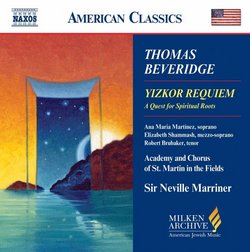| All Artists: Thomas Beveridge, Neville Marriner, Elizabeth Shammash, Academy of St. Martin-in-the-Fields, Ana Maria Martinez, Robert Brubaker Title: Thomas Beveridge: Yizkor Requiem (Milken Archive of American Jewish Music) Members Wishing: 1 Total Copies: 0 Label: Milken Archive Original Release Date: 1/1/2005 Re-Release Date: 10/18/2005 Genre: Classical Style: Opera & Classical Vocal Number of Discs: 1 SwapaCD Credits: 1 UPC: 636943945322 |
Search - Thomas Beveridge, Neville Marriner, Elizabeth Shammash :: Thomas Beveridge: Yizkor Requiem (Milken Archive of American Jewish Music)
 | Thomas Beveridge, Neville Marriner, Elizabeth Shammash Thomas Beveridge: Yizkor Requiem (Milken Archive of American Jewish Music) Genre: Classical
|
Larger Image |
CD DetailsSimilarly Requested CDs
|
CD ReviewsA good Tenor still doesn't make a Cantor Ido Keren | Ramat Gan, ISRAEL | 02/08/2008 (3 out of 5 stars) "This work has become an inseparable part of my 'musical metabolism' since first encountering it (through the Scribner Washington DC performance). The new Marriner performance is very accomplished, however, there's one serious reservation. As Beveridge himself explained (and is plainly apparent in the work itself), he here pays hommage to the Jewish/Hebraic roots of the Roman Catholic liturgy. Key to this spiritual and musical moto is the part of the Tenor solo, in fact - more of a Chazan (Hebrew for 'Cantor') than a regular tenor. Alberto Mizrahi in the Scribner recording IS a professional cantor, and, although he may no longer be at the peak of his vocal abilities, he's still able to carry over the special cantorial character of his part to the listener in a deeply moving vein. Robert Brubaker for Marriner obviously ISN'T a cantor, so, though his musical delivery is technically superior to that of Mizrahi, on the whole his performance is significantly lacking. Nowhere is it more apparent than in his final cadence (near the end of the Kaddish in the last movement). This is the only place in the work, where Beveridge allowed a measure of performing freedom. Also, for me at least, it's the High Point of the Requiem. Mizrahi rises to the occasion like a true Chazan, crowning the whole reading with a shattering Believer's Credo, while Brubaker misses his aim altogether, settling for the meagre obbligato notation Beveridge provides at that point. The Scribner performance scores over the present one also in the magnificent Choral Arts Society contribution. They're much more emotionally involved than their ASMF counterparts, while being no less accomplished technically. Finally, I find the Washington recording more successful, too: though a live one, it's both warm and clear, so even small details successfully register. Understandably, it benefits from the excitement of a live occasion. And the audience is remarkably self-controlled, too. All-in-all, the Scribner recording is the one to go for!"
|

 Track Listings (10) - Disc #1
Track Listings (10) - Disc #1








